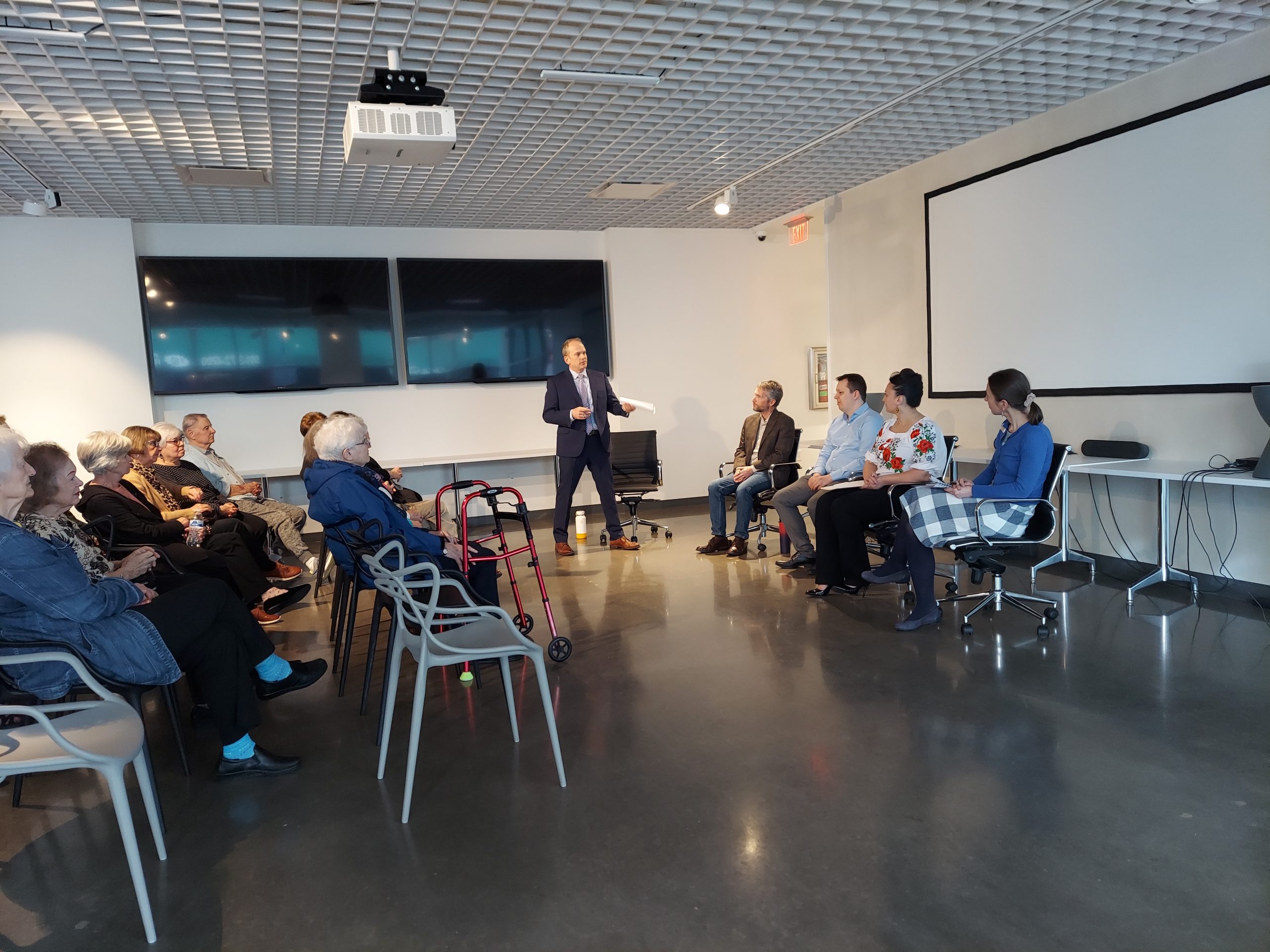UA Little Rock Downtown Panel Discusses Past, Present, and Future of Ukraine

UA Little Rock experts and members of the Arkansas Ukrainian community came together to discuss the current state of affairs in Ukraine, in light of the second anniversary of Russia’s invasion, during a March 12 panel held at UA Little Rock Downtown.
Dr. Eric Wiebelhaus-Brahm, political scientist from the UA Little Rock School of Public Affairs specializing in human rights and conflict-affected societies, and Dr. Marta Cieslak, director of UA Little Rock Downtown and historian studying East Central Europe, reflected on how social sciences can help us understand the ongoing conflict.
They were joined on the panel by Dr. Oleksiy Gudz, vascular surgeon and assistant professor at the Division of Vascular and Endovascular Surgery of the University of Arkansas for Medical Sciences (UAMS), and Dr. Kateryna Pitchford, professor of business at Central Baptist College in Conway, who represented the Arkansas Ukrainian community. Dr. Jess Porter, executive director of UA Little Rock Center for Arkansas History and Culture, moderated the discussion.
The panelists covered a wide array of topics, from the differences in news coverage of the war between the US and Eastern European media, how the war has affected Ukrainians’ understanding of their own national identity, President Vladimir Putin’s use of history to justify the invasion, and the changing position of the US Congress on the issue of aid for Ukraine.
Gudz and Pitchford shared their personal experiences on how the war has affected their lives and the lives of their fellow Ukrainians. Gudz, who before joining UAMS in 2023 lived and worked in Ivano-Frankivsk in Western Ukraine, recalled being woken up by the Russian missile attack at 5 a.m. on Feb. 24, 2022, the day the full-scale Russian invasion of Ukraine began.
Pitchford, who comes from Dnipro in Eastern Ukraine, stressed the unprecedented nature of the attack. She noted that few expected a major global power to violate the integrity of national borders in the 21st century, especially in Europe.
In response, Wiebelhaus-Brahm reflected on the limits of international law. He pointed out that the United Nations (UN) is not able to do much because of Russia’s veto power as a permanent member of the UN Security Council. He also discussed the weaknesses of the International Criminal Court (ICC), which holds individuals accountable rather than nations. While ICC indicted Russia’s President Putin and some of his collaborators, the organization has limited means to hold the Russian leadership accountable for the country’s documented violations of international laws. More hopefully, actions to hold Russia accountable, however futile, may create legal precedent that constrains other countries in a future conflict.
Cieslak commented on how Russia uses history to justify the invasion by presenting a version of Eastern European history in which Ukrainians are not a separate nation, but what Putin calls “Little Russians.” Consequently, that version of history undermines Ukraine’s right to exist as an independent state. Gudz added that Putin often claims Ukraine has been taken over by fascists and thus explains the invasion in terms of Russia’s supposed attempt to “denazify” Ukraine. Wiebelhaus-Brahm concluded that such false narratives “help Russians come to terms with what they are doing.”
The panelists also discussed the changing sentiments towards Ukraine and Ukrainians in the US. Shortly after the invasion, the US Congress welcomed Ukrainian President Volodymyr Zelensky; today, the fate of US aid for Ukraine is uncertain. Gudz, Pitchford, and Porter specified that a huge part of the US aid for Ukraine stays in the US and boosts the American economy because the funds are direct investments in the defense industry. Camden, Arkansas, has been one of the largest beneficiaries of this trend.
Audience members in the fully packed room asked how they could support Ukraine. The panelists stressed that any help, not only financial, matters, including small individual actions. Wiebelhaus-Brahm pointed out the importance of staying informed by reading a variety of sources to discern between credible news coverage and misinformation surrounding the war.
Cieslak emphasized the significance of education. She noted each audience member could help their communities understand how the war affects us all now and how it may affect us in the future. She pointed out that the international community should be paying close attention to the war. Cieslak mentioned that Article 5 of the NATO Treaty, which states an armed attack against one NATO member is considered an attack against all members, has never been tested, and it remains uncertain if and how the war may escalate beyond Ukraine’s border.
Pitchford encouraged the audience to call their representatives in Congress and express their support for Ukraine. She also stressed the importance of spreading awareness about how Ukrainian people feel and what they experience on a daily basis, both in Ukraine and in the US where Ukrainian refugees are trying to establish new lives. She noted that some of the people in the audience were recent refugees who could use help with simple things, such as learning English language skills or finding a job.
Gudz stressed the importance of international solidarity and thanked the audience for attending the panel and supporting Ukrainians.
“For the Ukrainian people, it is the most important thing to know that we are not alone,” Gudz said.
